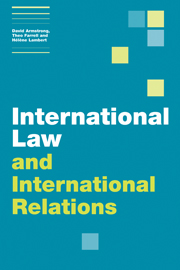3 - Three lenses: realism, liberalism, constructivism
Published online by Cambridge University Press: 05 June 2012
Summary
There is a certain irony in the mutual antipathy displayed by the disciplines of International Relations (IR) and International Law (IL). For as it happens, both disciplines are (and have been) united by common theoretical divisions. That is to say, the dominant paradigms in both disciplines are similar in their core ontological assumptions about the world; the main challengers in each discipline also share remarkably similar world-views. The dominance of realism in IR is matched by the dominance of positivism in IL. Both realism and positivism offer structural approaches to their subject that prioritise the role of states and instrumental action and downplay the significance of domestic politics, norms and ethics. Just as liberal institutionalism developed to challenge the dominance of realism in IR from the 1950s onwards, so legal positivism was challenged by an emerging liberal approach to IL from the 1940s onwards. These liberal challengers offer agent-centric approaches that highlight a plurality of actors in addition to states, as well as the role of domestic processes, normative action and ethical considerations in world politics.
As we noted in the introduction, there is growing appreciation among some IR and IL scholars that there is much to learn from each other's discipline. But this appreciation is confined to liberal scholars in IR and IL; realists still have little time for law, and legal positivists still consider politics and policy to be none of their concern.
- Type
- Chapter
- Information
- International Law and International Relations , pp. 69 - 114Publisher: Cambridge University PressPrint publication year: 2007



